2023 Genesis GV60 Review: Cannonball!
Rather than dip its toes into the EV pool, Genesis makes a big splash with the GV60.
Capital One
Hyundai Motor Group (HMG) may have timed the electric vehicle inflection point perfectly. After rolling out the Hyundai Kona Electric and Kia Niro EV several years ago, the Korean conglomerate got to work on its sophisticated Electric Global Modular Platform (E-GMP).
The "skateboard-style" platform incorporates the foundational vehicle architecture, battery pack, electric motors, and wheels upon which the automaker can construct numerous EVs of different sizes and shapes. The first E-GMP vehicles to sell in the U.S. were the 2022 Hyundai Ioniq 5 and the 2022 Kia EV6. Now, the group’s luxury brand gets its turn and debuts the 2023 Genesis GV60 compact crossover SUV.
Available in Advanced and Performance trim levels, the 2023 Genesis GV60 includes standard dual-motor AWD and supplies up to 248 miles of driving range. Either version of the vehicle is well equipped and offers comfortable seating for up to five people, and cargo space expands from 24 cubic feet behind the back seat to a maximum of 54.7 cu.-ft. Additionally, a tiny frunk (front trunk) measures 0.7 cu.-ft.
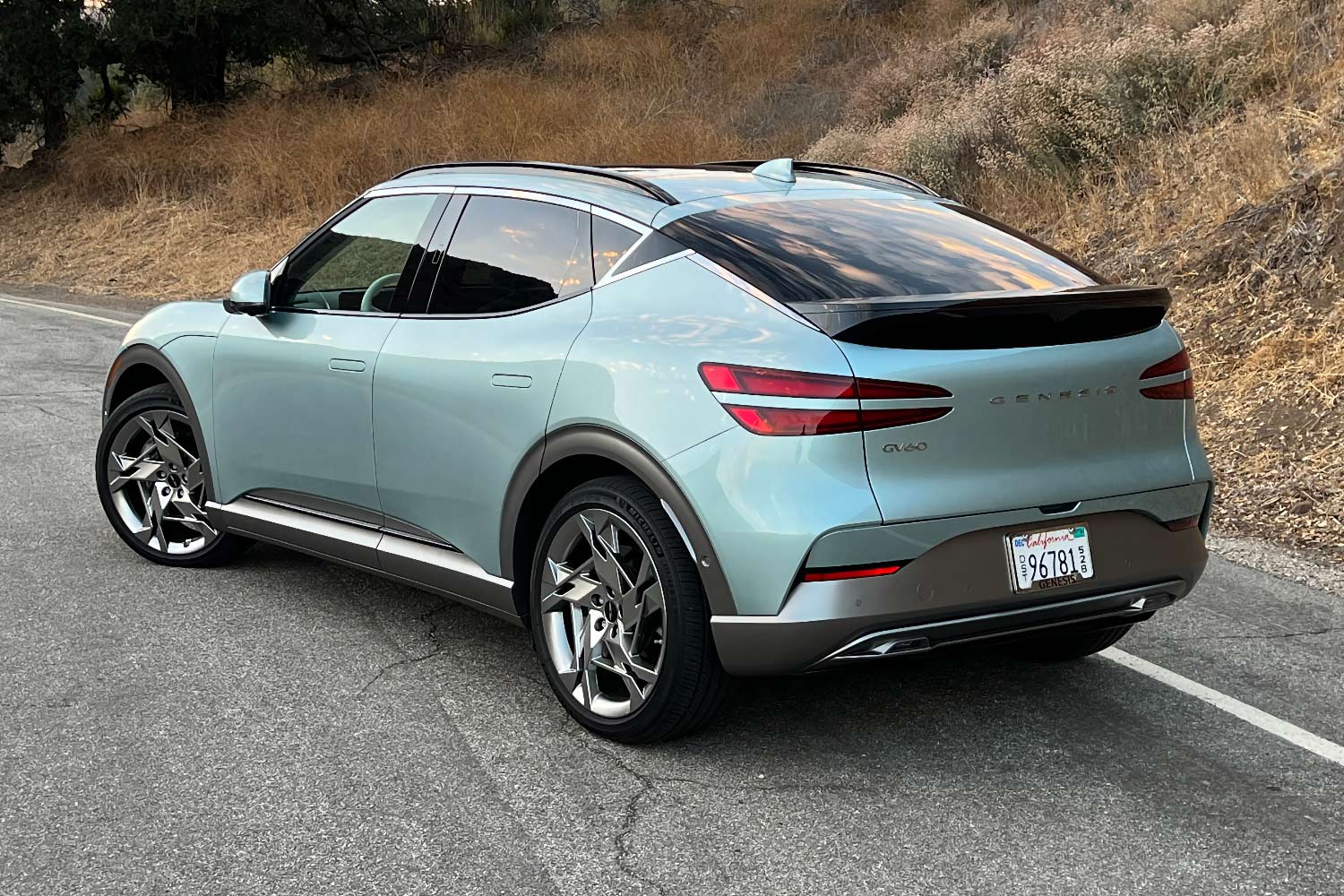 Christian Wardlaw
Christian Wardlaw
Genesis says the new GV60 "will set a new standard for luxury electric vehicles with a powerful driving performance" and is "a symbolic model that materializes the unique values and the sensibilities that Genesis stands for." The automaker further explains that the GV60's role is to offer "a satisfying experience to our customers who want something of value, but different."
For this 2023 Genesis GV60 review, we test-drove the Performance version in Southern California. It came with extra-cost Hanauma Mint paint, bringing the Manufacturer's Suggested Retail Price (MSRP) to $69,560, including the $1,095 destination charge. Genesis provided the vehicle for this GV60 review.
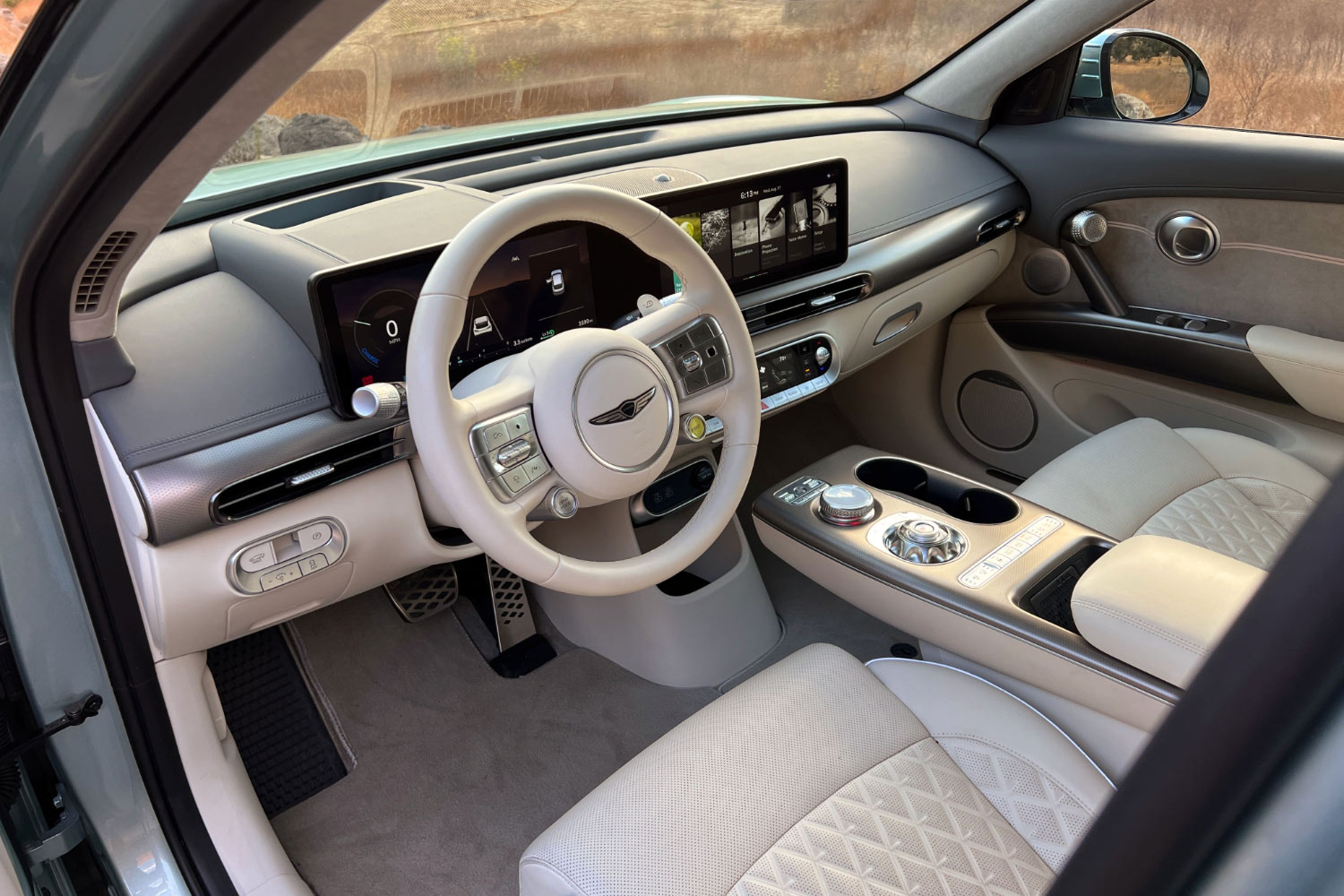 Christian Wardlaw
Christian Wardlaw
2023 Genesis GV60 Review: The Design
With the GV60, Genesis departs from its latest design language with a clean-faced look, a modified expression of its diamond-mesh Crest Grille mounted low on the front bumper, and a short clamshell hood lacking the automaker's traditional power bulge. The change in direction leaves the GV60's signature front and rear lighting elements to convey the EV's brand identity.
The GV60 looks much better in person than in pictures, especially in Performance trim with its intricately styled 21-inch wheels pushed out to each corner of the car. The test vehicle's Hanauma Mint paint is also more appealing in real life, glinting in the sunlight. Indeed, it reminds you of the coastal waters of Hawai'i and is an unusual hue that serves to attract attention to the Genesis while drawing a sharp contrast with the polished wheel finish and the Ash Gray and Glacier White interior.
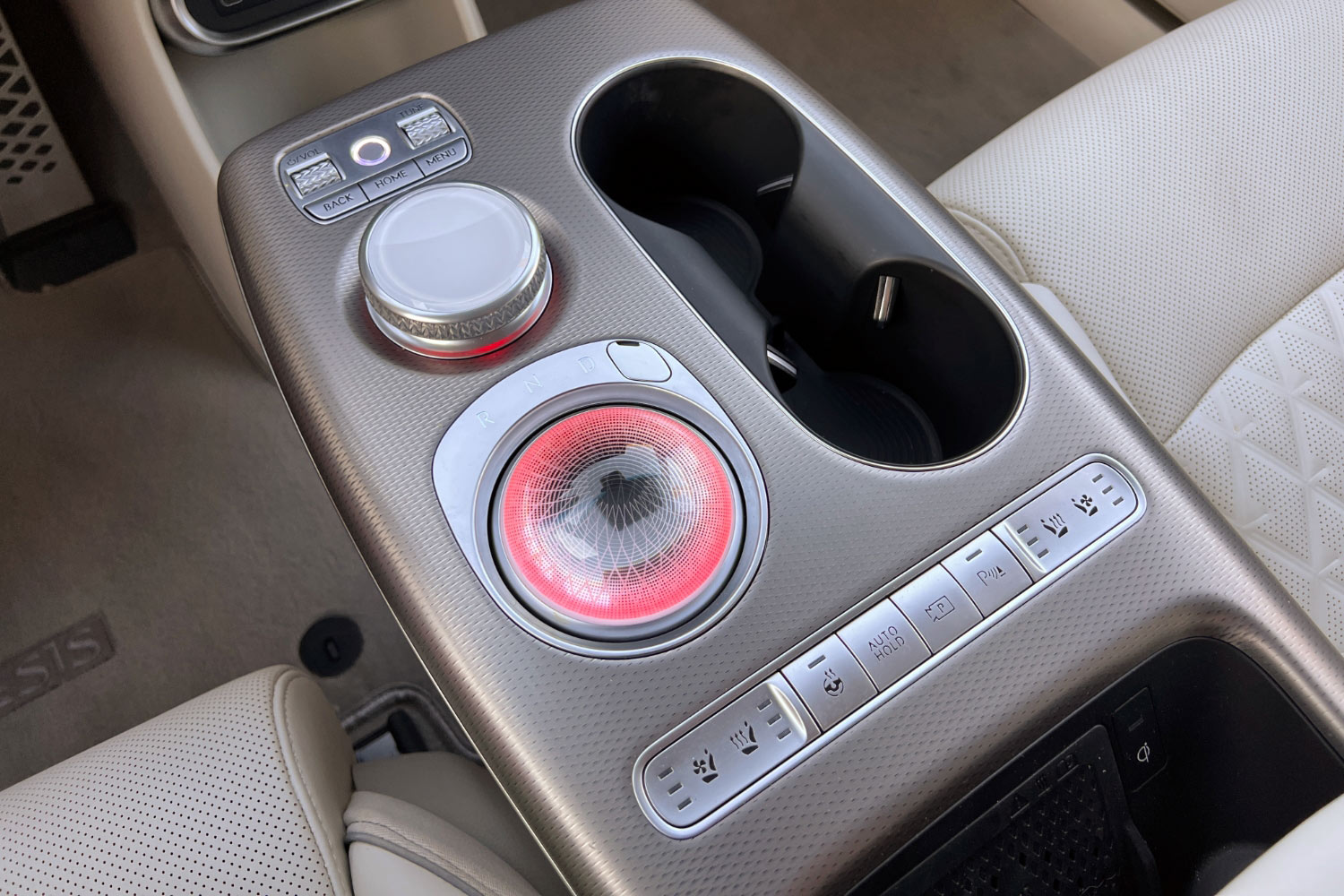 Christian Wardlaw
Christian Wardlaw
With Performance trim, diamond-patterned and perforated premium Nappa leather wraps around the seats, while artificial suede covers the headliner and door panels. A blend of genuine aluminum and silver plastic decorates the cabin, which Genesis renders in a compelling mix of high-tech displays and retro details. The star of the show, though, is the Crystal Sphere gear selection on the freestanding center console. It serves as a piece of illuminated interior jewelry until you push the start button, and then it rotates to reveal the gear selector.
As is often the case, attempts to simplify the GV60's interior lead to occasional confusion and frustration. Furthermore, buttons and switches rendered with dark lettering on a metallic surface are sometimes hard to read, and the Mercedes-style touch sensor on the steering wheel requires some time to get comfortable with. However, the sheer diversity of the top layer of the infotainment system's card-style menus makes it easier to find things that might otherwise remain buried from view. In addition, Genesis uses beautiful photography to illustrate each card, underscoring the GV60's artfully rendered cabin.
As sumptuous and stylish as the GV60's interior is, we did discover a flaw that could irritate an owner over time. Genesis constructs the door panel trim housing the power window controls and grip handles with silver plastic, and in the test vehicle, it creaked under pressure, such as when bracing a leg in this location. It is the only thing that degrades the GV60's overall aesthetics and quality.
Because Genesis builds the GV60 on a skateboard platform, designers can maximize interior room by pushing the wheels out to the corners of the vehicle and giving it a flat interior floor. That approach also gives Genesis wide latitude concerning how it configures the cabin, and you can see this in how the automaker deftly crafts the GV60's storage space. From the "floating" center console design with its covered and hidden storage areas to the drawer that slides out of the dashboard in place of a traditional glove compartment, the GV60 demonstrates innovation that sometimes comes at the expense of practicality.
Every GV60 includes a 14-way power-adjustable driver's seat with a cushion extension for added thigh support. In addition, the seat offers a Smart Posture Care function that translates body measurements into an ideal seating position. Unfortunately, I wasn't crazy about the one Genesis thought I would like, so I didn't use it.
Performance trim adds an Ergo Motion system for the driver, which is similar to a massage function but focuses specifically on posture enhancement and fatigue reduction. It works and makes the GV60 even more comfortable than it already is. I continued to use this feature during my time with the EV.
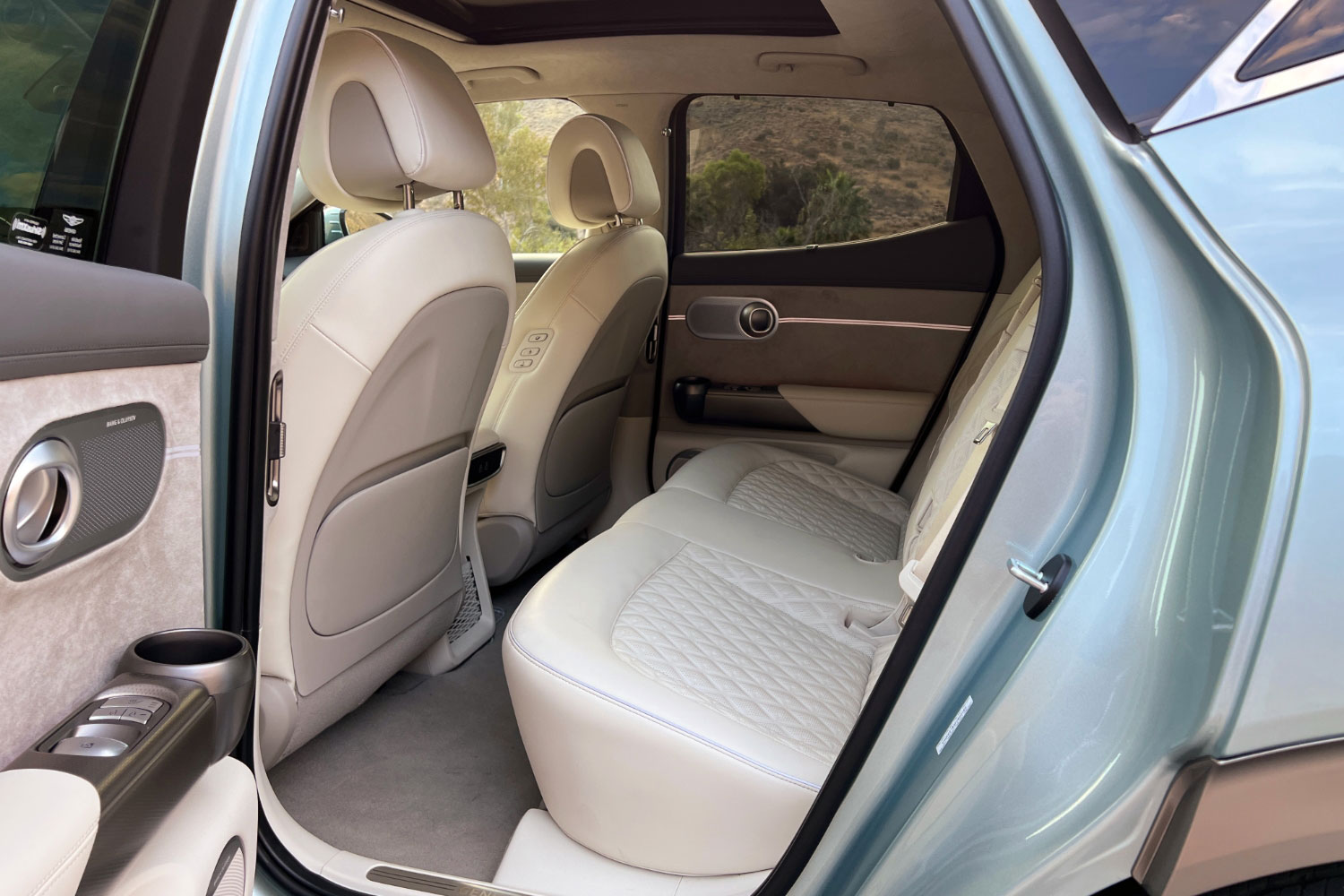 Christian Wardlaw
Christian Wardlaw
Wide door openings and the GV60's raised height make it easy to get into and out of this Genesis. Front passengers benefit from a 12-way power-adjustable seat; every GV60 includes heated and ventilated front seats. Heated rear seats are standard with Performance trim. The back seat is exceptionally comfortable for two people and carries three when necessary.
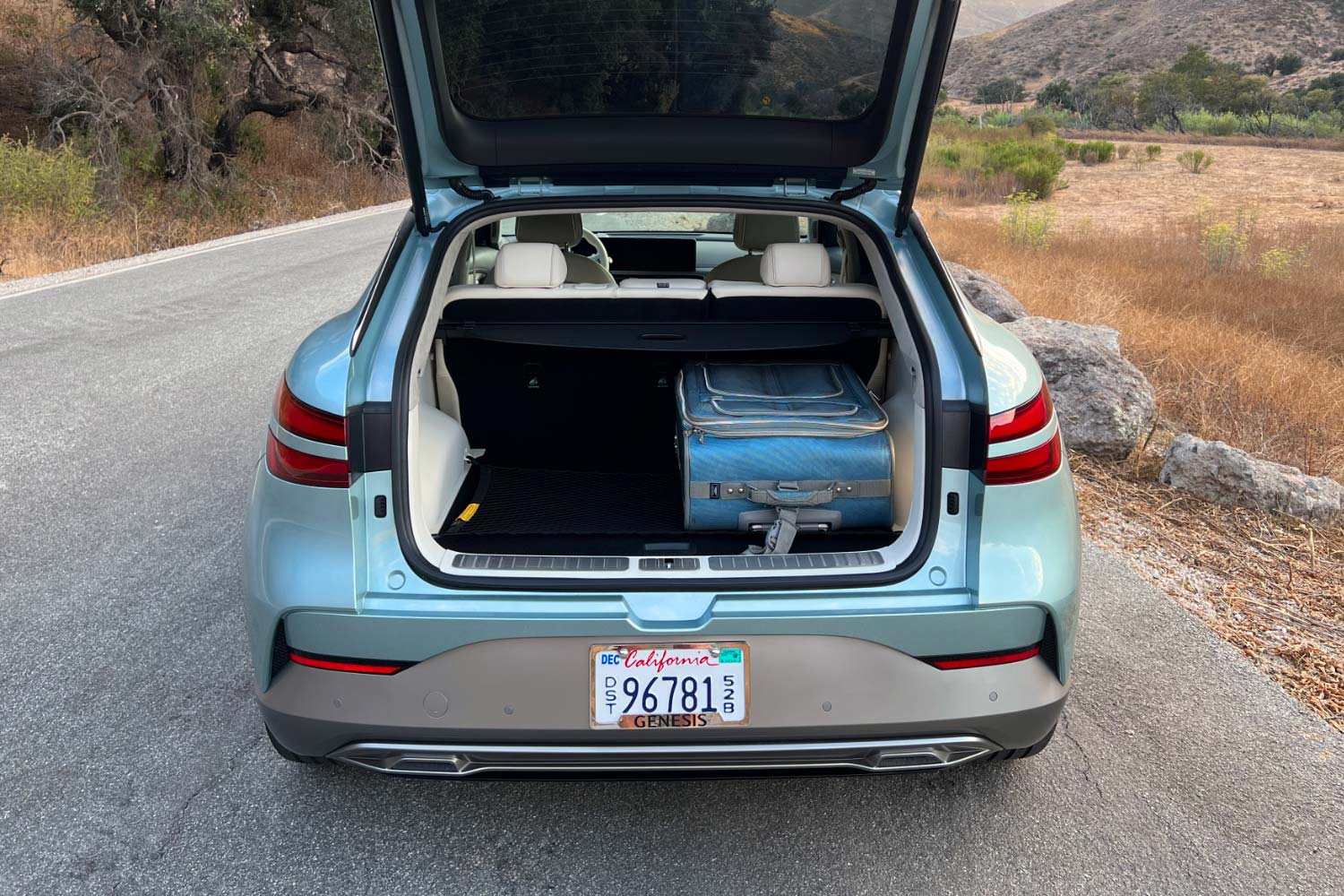 Christian Wardlaw
Christian Wardlaw
Behind the back seat, you'll find a 24 cubic foot trunk. It holds two full-size suitcases and smaller items under the cargo cover. Remove the cover, and you can carry four suitcases in the cargo hold. If you don't have rear passengers, fold the back seat down to maximize the space at 54.7 cu.-ft. These numbers fall in the middle of the range of cargo space for subcompact SUVs, making the GV60's lack of a larger frunk more disappointing.
2023 Genesis GV60 Review: The Technology
Genesis installs a stupefying amount of technology in the new GV60, and you encounter it before you set foot in the car and push the start button.
First up is Face Connect with a Fingerprint Authentication System. Once you set this up, a small panel on the center roof pillar recognizes your face and unlocks the GV60. Then, a sensor on the center console scans your fingerprint to activate the vehicle's start button. We set this up, and it works, but you don't need to use this feature to open and drive the Genesis in the usual way — with a key fob — so don't let this dissuade you from choosing this model.
Genesis also offers a Digital Key system for the GV60. It transforms your iPhone or Samsung smartphone into the vehicle's key, the GV60 recognizing the device, unlocking the doors, and activating the drive system. But, again, you need not use this feature to drive the Genesis.
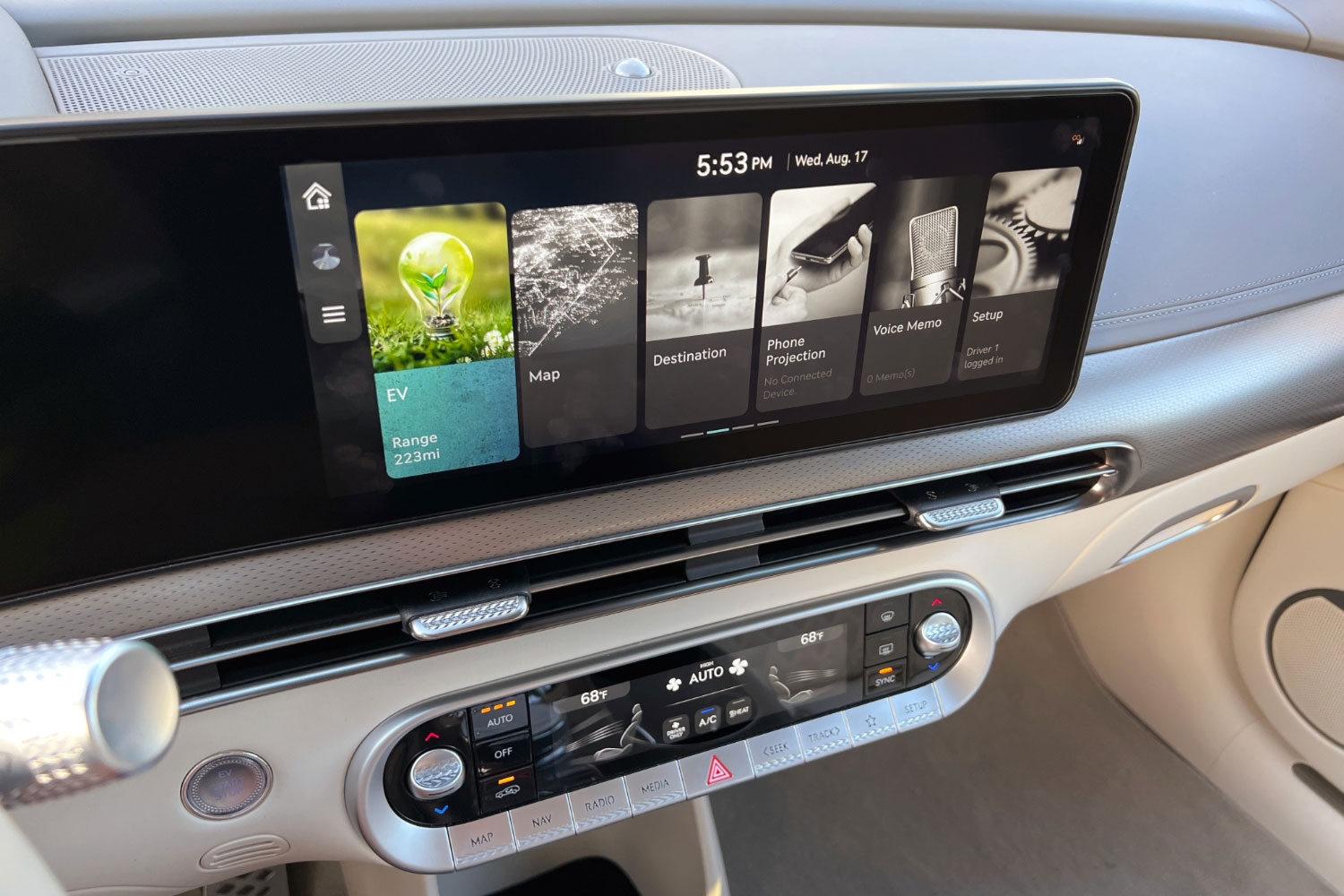 Christian Wardlaw
Christian Wardlaw
I preferred to keep the GV60's stylish-looking remote key fob in my pocket. Once settled into the driver's seat, push the start button, and the 12.3-inch digital instrumentation and 12.3-inch touchscreen navigation systems illuminate, ready for use. You can use steering wheel controls for cycling through the instrumentation data panels. The infotainment system responds to inputs at the screen via physical controls on the steering wheel and center console or by voice commands through what Genesis calls a dynamic voice recognition system.
The technology quickly and accurately responded to nearly all queries during the evaluation. Also, the 17-speaker Bang & Olufsen premium audio system supplied excellent sound quality, as I expected from this brand. However, as mentioned previously, the GV60's depth and breadth of configurability, coupled with hard-to-see steering wheel control markings and sometimes unintuitive operation, can make using the features while driving an exercise in distraction.
Our test vehicle also had a terrific head-up display rich with valuable data, including blind-spot warning notifications. Unfortunately, I had trouble seeing it while wearing polarized sunglasses.
Just as Genesis equips the GV60 with every infotainment and convenience technology it could bake into the SUV, so this new electric crossover boasts a long list of advanced driving assistance systems (ADAS). Some are designed to prevent a collision, and some are designed to protect you in a crash. Others exist to make your life a little easier.
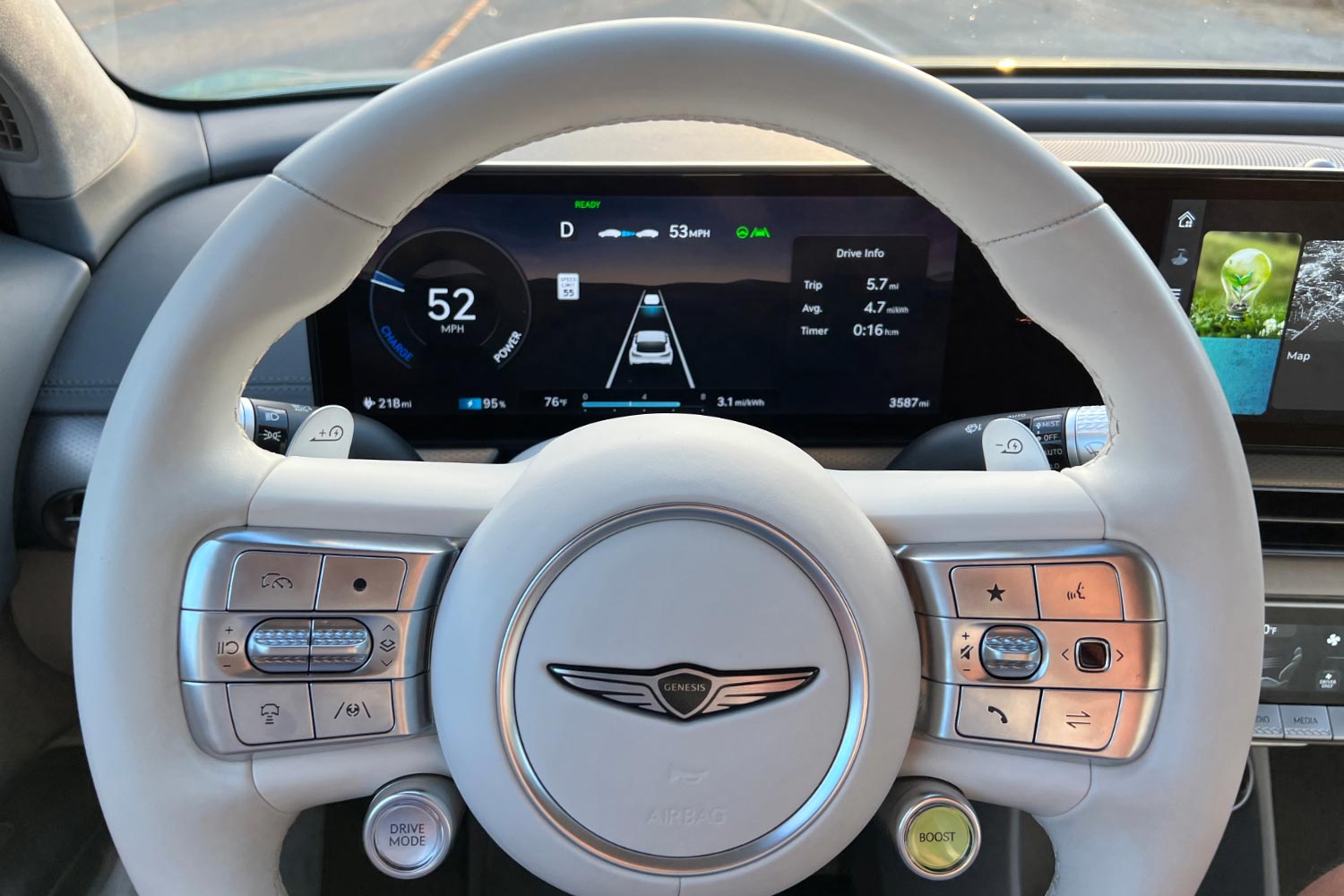 Christian Wardlaw
Christian Wardlaw
Take Remote Smart Parking Assist (RSPA), for example. This technology allows you to exit the GV60 and command it to park itself in a parallel or perpendicular space while you're standing outside of the vehicle. I've used this in a Hyundai Nexo, and it is impressive. But it's not practical because you can't use it on a busy road or in a crowded parking lot without angering fellow motorists since the tech takes its time.
Other unusual ADAS tech stack features include a camera-based Blind-Spot View Monitor and Highway Driving Assist (HDA), which pairs adaptive cruise control with a lane-centering assist system to provide a semi-autonomous driving feature. Of course, you must keep your hands on the steering wheel. Still, it works so well that Genesis appears to be on the precipice of offering a hands-free system similar to Cadillac Super Cruise, Lincoln Active Glide, and Tesla Autopilot.
While evaluating as much of the ADAS tech as possible, I found the lane-departure warning and lane-keeping assist systems to issue many false notifications and inaccurate lane corrections (when used without HDA). That's odd, considering how nearly faultlessly HDA operates.
2023 Genesis GV60 Review: The Drive
When you choose the GV60 Performance over the GV60 Advanced, you get 429 horsepower and 516 lb.-ft. of torque — increases of 115 and 70, respectively — and an electronic limited-slip differential. Performance trim also includes larger 21-inch wheels, bigger and more capable brakes, and an adaptive damping suspension that can adjust itself before encountering bumps and holes in the pavement. In addition, a Boost Mode, accessible using a "Boost" button on the steering wheel, can increase power output to 483 hp for ten seconds at a time.
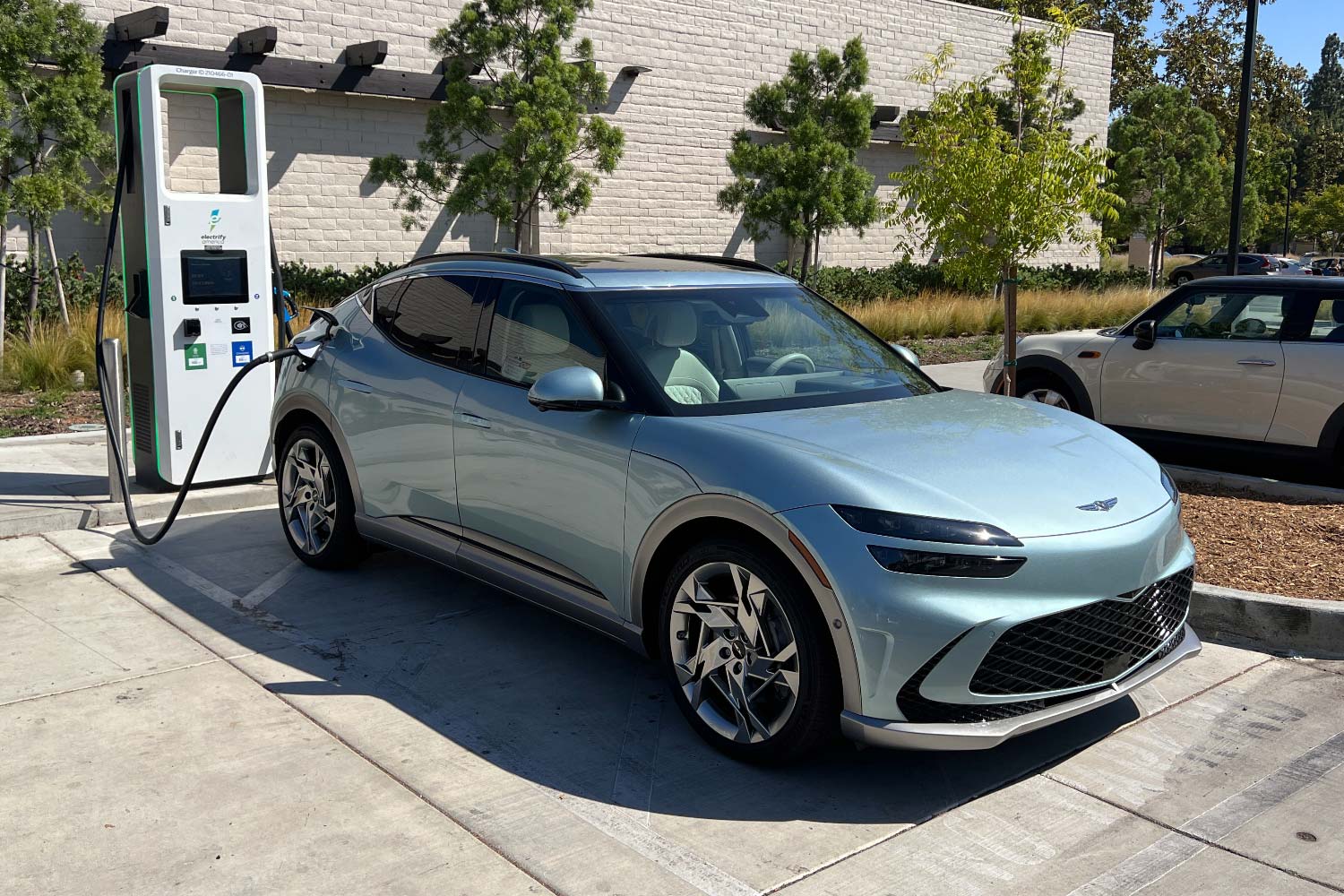 Christian Wardlaw
Christian Wardlaw
In exchange for this added performance, plus a more sumptuous interior, Genesis lightens your wallet by about $10,000. Unfortunately, you also give up some driving range, which is 235 miles with Performance trim compared to 248 with Advanced trim.
As you might guess, the GV60 Performance is a blast when accelerating. Stealthy, swift, and nearly silent, it rockets forward, especially when using Boost Mode. However, instantaneous speed is the GV60's single impressive trick because when the road starts to kink and curve, unless the pavement is absolutely smooth, the GV60 tends to bounce around despite its adaptive damping suspension, especially at the rear. Switching from Comfort to Sport mode tempers this behavior but doesn't eliminate it.
The GV60 can whip around properly banked curves with ease thanks to impressive tire grip and a naturally low center of gravity — hat tip, battery pack. Additionally, with the GV60’s wheels positioned out at the corners, the handling stability situation is also improved. Unfortunately, the steering doesn't communicate much about what's happening at the road's surface. Also, while the braking system and pedal feel are generally agreeable, when I was hustling the GV60 and trail-braking into corners, the brakes would suddenly feel less effective as weight transferred to the outside front wheel.
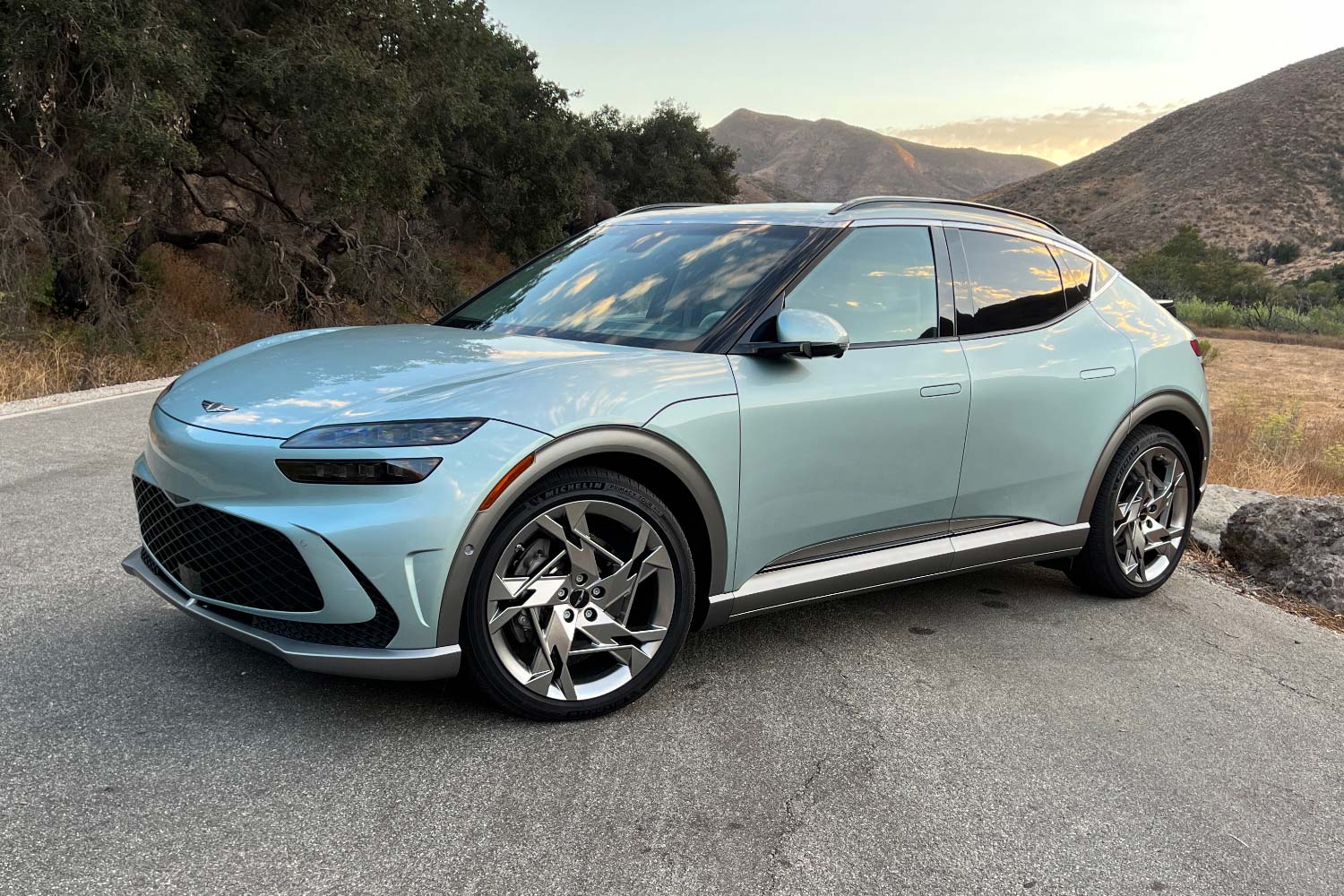 Christian Wardlaw
Christian Wardlaw
Admittedly, chances are good that you won't drive the GV60 Performance with the same level of enthusiasm that I did. However, it is a pleasure at a slower pace, no matter the environment, and I thoroughly enjoyed the GV60 in typical driving situations.
The adaptive "road preview" suspension works more effectively in everyday driving, and the GV60's tidy size and point-and-squirt instant acceleration make the GV60 easy to drive in congested urban areas. Parking is easy, especially with the numerous camera views, and I'm a fan of the i-Pedal regenerative braking system that allows for one-pedal driving. However, there is more road and wind noise than I expected, especially considering Genesis's effort to suppress it. Acoustic windshield and door window glass is standard, as is an Active Noise Control system.
I embarked on my evaluation route with 119 miles of estimated driving range and a 58-percent battery charge with the Genesis in Comfort mode and the i-Pedal system in its least aggressive setting. After traveling 68 miles, during which I switched into Sport mode for mountain driving, the GV60 said it had 49 miles of remaining range and a 24-percent battery charge. According to the trip computer, the GV60 traveled 2.8 miles for every kilowatt-hour of electricity it used. The test vehicle was slightly more efficient than expected based on the EPA's estimate of 37 kWh per 100 miles of travel, which translates to 2.7 miles per kWh.
Like the Hyundai Ioniq 5 and Kia EV6, the Genesis GV60 has a 400-volt/800-volt rapid charging system and is compatible with Level 3 fast-charging stations delivering up to 350 kW of power. Those remain rare in the U.S., but if you find one, Genesis says the GV60 recharges from 10 percent to 80 percent in 18 minutes.
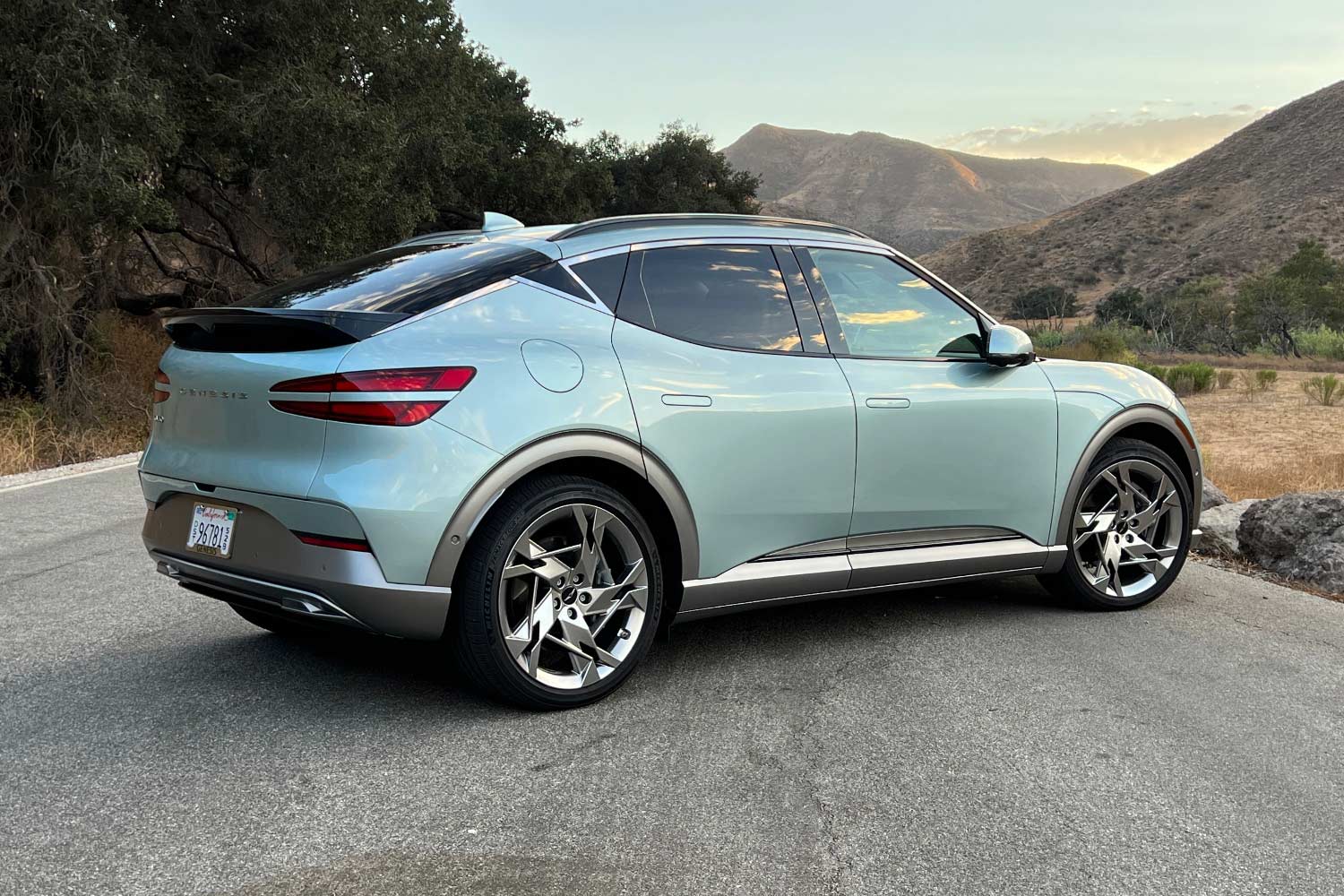 Christian Wardlaw
Christian Wardlaw
My local Electrify America charging stations offer up to 150 kW, and they're located in the middle of a plaza that includes coffee shops, restaurants, and retail outlets. In other words, there is plenty to keep you busy while recharging your car.
Wanting to see what we could get by connecting for 15 minutes, I plugged the GV60 in, activated the charging session via my smartphone app and the charger told me it would take 19 minutes to bring the GV60's battery from 24 percent to 80 percent. If I wanted it completely topped off, the estimated time was 47 minutes. Fast chargers slow down after 80 percent to protect the battery from heat and to ensure its longevity.
At the 15-minute mark, I unplugged the GV60. The session brought the battery up to 68 percent and range to 131 miles. The process was simple, easy, and hassle-free.
As for the cost of recharging the GV60, I’ll give you my own experience as an example: I have a free, basic Pass membership plan with Electrify America. Pass members pay 43 cents per kWh in California, so my charging session came to $14.19, which was deducted from my account. If I paid $4 per month, I could get a Pass+ membership, which reduces the rate to 31 cents per kWh.
The alternative to public fast chargers is installing a Level 2 home-charging station. My utility company says that if I had one and recharged the GV60 overnight (when rates are lowest), I would pay anywhere from 20 cents to 65 cents per kWh. The cost depends on the customer's rate plan, the time of year, and the overall household electricity consumption rate. My current plan with this utility would put me at 28 cents per kWh, but they offer a specific plan for EV owners that can reduce that to as low as 20 cents per kWh at night during the winter.
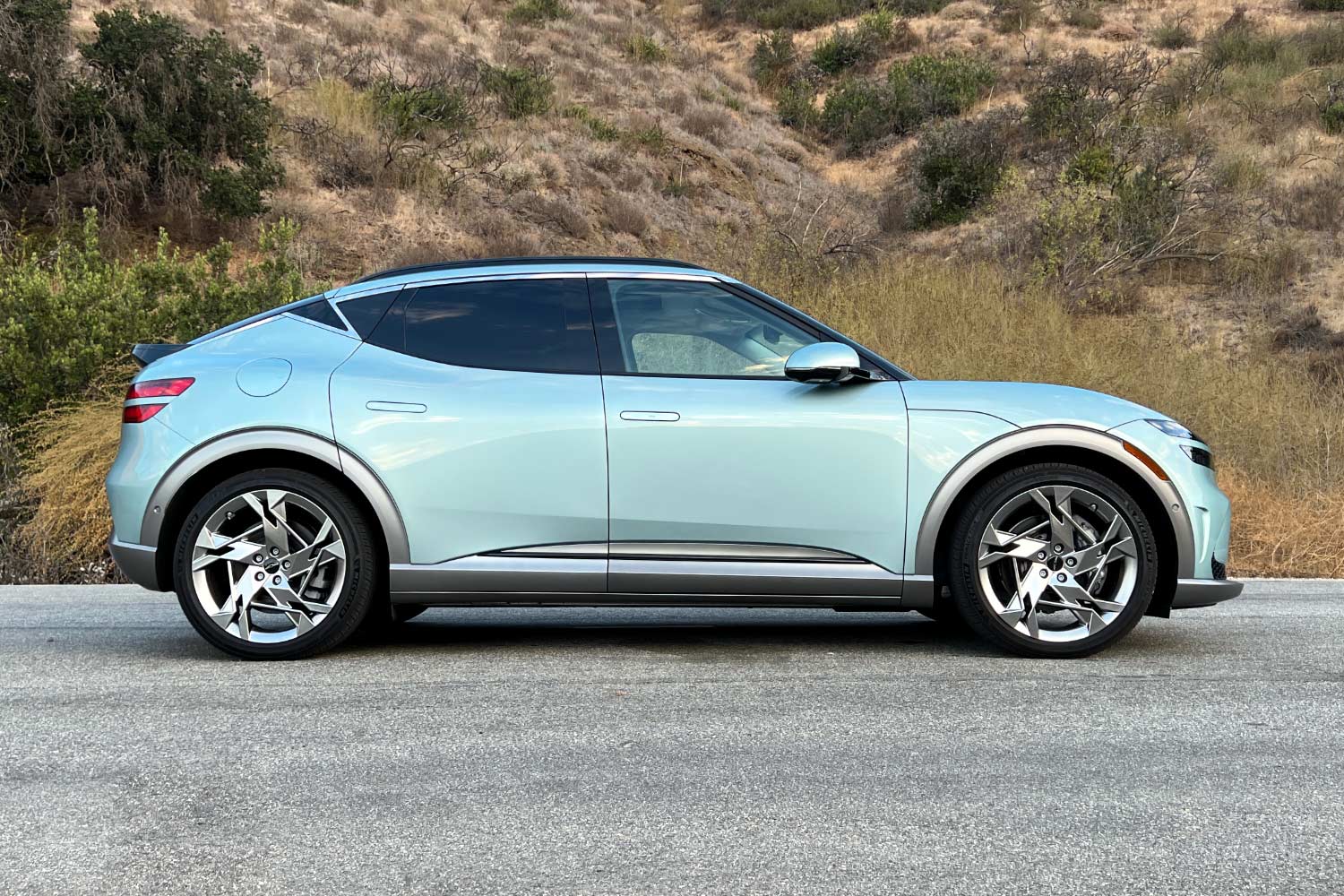 Christian Wardlaw
Christian Wardlaw
Of course, adding a home charging station is expensive, especially if you need to upgrade your electrical panel or perform other updates to make it work. But, if you're committed to going electric, it could be the most convenient and affordable way to keep your vehicle charged over the long run. Make sure to check with your utility company prior to investing in a home charging station to verify rates and the availability of rebates.
Is the 2023 Genesis GV60 a Good Electric Vehicle?
Yes, the new Genesis GV60 is a good electric vehicle. While it doesn’t match the driving range offered by some rivals, its rapid fast-charging capability helps to make up for the shortfall. Find a 150-kW fast charger (or better yet, a 350-kW unit), and you'll be back on the road before you know it. In addition, the GV60's Vehicle-to-Load (V2L) power export capability could come in handy. These features, coupled with the GV60's high-style design and outstanding technology, make it an excellent choice for a luxury EV.
Written by humans.
Edited by humans.
 Christian Wardlaw
Christian WardlawChris says his first word was "car." For as long as he can remember, he's been obsessed with them. The design. The engineering. The performance. And the purpose. He is a car enthusiast who loves to drive, but is most passionate about the cars, trucks, and SUVs that people actually buy. He began his career as the editor-in-chief of Edmunds.com in the 1990s, and for more than 30 years has created automotive content for CarGurus, J.D. Power, Kelley Blue Book, the New York Daily News, and others. Chris owns Speedy Daddy Media, has been contributing to Capital One Auto Navigator since 2019, and lives in California with his wife, kids, dog, and 2004 Mazdaspeed Miata.
Related articles
View more related articles